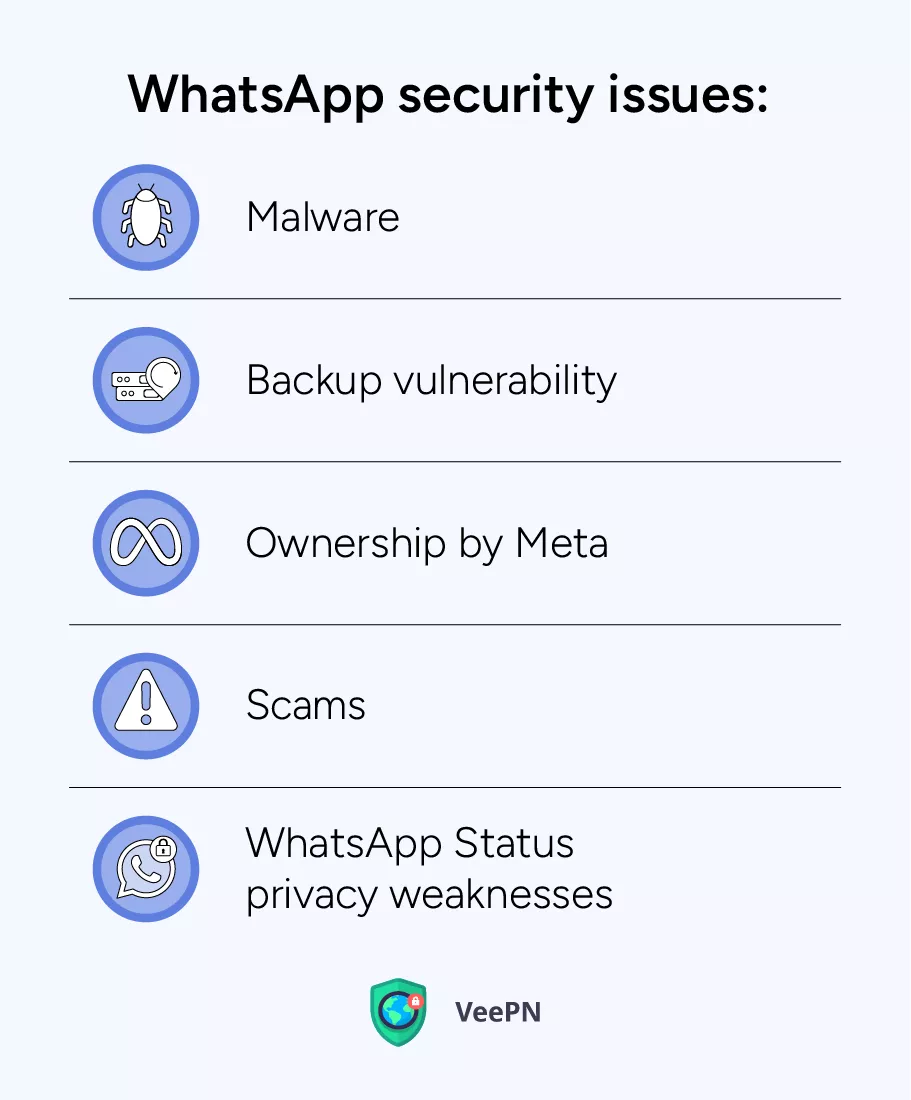Is WhatsApp Safe for Secure Messaging in Today’s World?
The popularity of WhatsApp is unquestionable, with around 3.031 billion monthly active users who believe this messenger is reliable enough for personal and business communication. But such a belief is far from reality. In 2023, it was reported that 487 million of WhatsApp users’ mobile numbers were stolen due to data leakage. So if you ask “Is WhatsApp secure and private?”, that will be a fair question. In this article you will find the answer, so let’s dig in!

How safe is WhatsApp? An overview of WhatsApp’s security features
Is WhatsApp safe to use? To answer this question, let’s discuss major WhatsApp privacy and security features:

- End-to-end encryption. It is a reliable security method, which significantly reduces risks of hacking attempts and man-in-the-middle attacks. Such encryption makes every single message encoded on your device before being sent, making your communication on WhatsApp secure and reliable. When your contact receives this message, it gets decoded on their device, so that only you and them can read the message.
- Disappearing messages. This WhatsApp feature deletes any messages you receive/send as soon as you read/write it. In such a way, nobody can snoop on your private conversations.
- Safety numbers. WhatsApp safety numbers, also known as security codes or encryption keys, are unique identifiers generated for each conversation to ensure end-to-end encryption. When you chat with someone on WhatsApp, comparing safety numbers ensures that your messages are only accessible to the intended contact and cannot be intercepted.
- Screen lock. WhatsApp’s screen lock feature allows you to add an extra layer of security by requiring authentication (such as a PIN, fingerprint, or facial recognition) before accessing the app. This helps prevent unauthorized access to private messages and sensitive information stored within WhatsApp.
- Private notifications. This feature enables you to make any WhatsApp notifications hide the content of a message you receive. You’ll still get notifications, but nobody can see who messages you and what’s inside the message.
But even with such a convincing set of security and privacy features, WhatsApp is not really safe. Simply put, its security capabilities are very limited in comparison to other messengers such as Signal, which is far superior in terms of data safety and user privacy.
If you care about your security, switching to the above-mentioned Signal might be your go-to. Still, if you’re not into abandoning your favorite app, it’s better to know what dangers WhatsApp may imply to be confident that you won’t fall victim.
WhatsApp security issues
As said, WhatsApp is not really safe as there are various privacy threats you may face using this messenger:

- Malware. The majority of malware comes from web and desktop versions of WhatsApp. In general, App Store and Google Play Store are particularly careful about security of mobile apps they offer, which means hackers are focused on alternative ways to mask malware as a legitimate app. However, in 2019 hackers succeeded in planting spyware across all WhatsApp client apps compatible with Android, Windows Phone, and Tizen OS.
- Backup vulnerability. WhatsApp offers a data backup feature which allows you to restore deleted messages from your Google Drive or iCloud. These online storages don’t have any data encryption, which creates a perfect loophole for hackers and scammers to steal your data.
- Ownership by Meta. WhatsApp belongs to Meta, the owner of Facebook. And it’s a big red flag for many, as the company follows a policy of data sharing between Facebook and other platforms in Meta’s ownership. So, if Facebook can see your personal information from WhatsApp, there are very high chances third parties like advertising agencies can see it too.
- Scams. This WhatsApp security risk is particularly common. There are 19.2 million WhatsApp scam texts straying across the platform in 2024, so this security issue doesn’t seem to be resolved any time soon.
- WhatsApp Status privacy weaknesses. Similar to Instagram Stories, this feature lets you share your daily moments in your profile that will automatically disappear in 24 hours. But if you don’t set your Status to be seen by your friends only, anyone can see it, which is an open invitation for scammers and fraudsters to use this information for stalking you or impersonating your relatives and friends.
Considering the above, is WhatsApp a secure platform, really? Long story short, uncareful use of WhatsApp can present a serious threat to your online safety. If you want to keep using this app, you need to learn some ways to protect yourself online.
How to use WhatsApp safely
Take these safety measures to ensure you’re completely protected from security threats in WhatsApp:

- Regularly update the app. It’s important to regularly update your device to ensure you have the most recent security patches and bug fixes. Enabling auto-update for WhatsApp is a reliable way to be confident you use the app’s most recent version.
- Use strong passwords. Regardless of WhatsApp’s robust encryption, maintaining message privacy relies on strong passwords. Although a short phrase may seem convenient, it’s still vulnerable to cracking. Instead, opt for lengthy, complex passwords devoid of recognizable words, incorporating a blend of letters, numbers, and symbols. Ideally, it has to be at least 10 characters long.
- Review connected devices. Regularly check WhatsApp’s list of connected devices and verify that only trusted ones have access to your account.
- Use two-factor authentication (2FA). Enable 2FA in your WhatsApp settings to bolster security. This way, you’ll have to enter a PIN or password during the setup process on any new device, adding the extra security step.
- Use a virtual private network (VPN). A VPN app can encrypt all your Internet traffic and conceal your identity, keeping hackers and online threats away from you. However, we highly recommend you to refrain from using free VPN apps as they can collect your personal information and sell it to third parties. Instead, consider using a premium VPN service like VeePN which follows a strict No Logs policy and can guarantee you maximal data security without losing Internet connection speed.
Overall, if you want to avoid any online risks when using WhatsApp, we recommend using VPN as it can shield not only your WhatsApp communication but your Internet privacy as a whole. Let’s see how it’s possible.
How VPN can protect your privacy in WhatsApp and online
A reliable VPN application always comes with a range of security features to safeguard your sensitive information. They are the following:

- Internet traffic encryption. A VPN app encrypts all your Internet traffic and passes it through a separate “tunnel” to a remote server, making your data impossible to intercept and decipher.
- IP address masking. A trustworthy VPN app has access to multiple remote servers, letting you hide your IP address. As a result, hackers won’t be able to see your real location as you have an IP address of a country where a remote server is located.
- Kill Switch. Even if a VPN connection fails for some reason, this feature automatically restricts Internet access to your device, so no one will be able to use this moment for stealing your personal information.
- Antimalware app. Such an application can block any malware and pop-up ads in a browser, shielding you from viruses or accidentally clicking on a phishing link.
VeePN can provide you with these security features and beyond. The application uses AES 256-bit encryption standard that is considered the most reliable so far and used by the US government for protecting sensitive data. At the same time, you can be sure your Internet connection won’t suffer as VeePN offers over 2,500 servers in 89 locations and uses WireGuard® protocol for a fast and solid data encryption that doesn’t affect the connection speeds.
Safeguard your WhatsApp messages with VeePN
All in all, WhatsApp is not safe. Scams, malware, unsecure backups, and vulnerability of Status posts are convincing facts that this messenger is far from being secure despite its popularity with ordinary users. However, by following some simple yet effective tips, you can improve your security while using WhatsApp. The most important tip would be to use a reliable VPN service to protect your sensitive information and prevent online tracking.
VeePN is just what you need to secure your privacy. VeePN offers top-tier data encryption and additional security features such as Double VPN and protection of up to 10 devices per subscription. Download VeePN today with a 30-day money-back guarantee!
FAQ: Is WhatsApp safe and private?
There have been many concerns regarding privacy and security of WhatsApp such as malware, scams, and encrypted backup storage. Additionally, data sharing with WhatsApp parent company, Meta, is another concern as this company is known for selling users’ data to third parties. Read this article to learn more about WhatsApp security and how to improve it.
It’s highly unlikely for someone to spy on your WhatsApp messages due to the app’s end-to-end encryption, which ensures that only you and the recipient can read the messages. However, there are potential vulnerabilities such as malware on your device or unauthorized access to your account. It’s essential to keep your device and WhatsApp app updated and secure, and use a reliable VPN service like VeePN to minimize your privacy risks.
To avoid WhatsApp scams, only communicate with familiar contacts, be cautious of suspicious messages or offers, and verify URLs before clicking on any links. Additionally, enable two-step verification for added account security and report any suspicious activity to WhatsApp support team.
No, WhatsApp is not entirely safe from hackers. Although this messaging app provides some decent security features, such as end-to-end encryption, disappearing messages, and safety numbers, it lacks certain protection measures and can be vulnerable to cyber-attacks. In particular, you may fall victim to spyware, WhatsApp scams, and other threats. Find out more in this article.
Since WhatsApp uses powerful end-to-end encryption, it’s relatively safe to send private photos through this app. Still, keep in mind that WhatsApp isn’t completely secure. There have been several incidents that involved spyware attacks. Besides, the app’s data backup feature doesn’t provide encryption, putting your sensitive info at risk. Check out this article for more details.
VeePN is freedom




Good article
The end-to-end encryption is nice, but Meta and the backup problems are a no-go
After reading this, I’m not sure how secure WhatsApp is anymore.
How safe is WhatsApp if they cannot even safe backups?
Honestly, after reading this, I’m starting to wonder: So is WhatsApp really hack proof? It is all very worrying and when it involves Meta, which seems to be involved in all of it, it feels like my privacy is in trouble.